
FINANCIAL ANALYSTS JOURNAL
Scope & Guideline
Advancing the Frontiers of Financial Analysis
Introduction
Aims and Scopes
- Empirical Asset Pricing:
The journal emphasizes empirical studies that explore asset pricing models, including the behavior of stock and bond markets, factor models, and the impact of macroeconomic variables on returns. - Investment Strategies and Performance:
Research on various investment strategies, including active and passive management, factor investing, and private equity performance, is a key focus, providing insights for practitioners. - Risk Management and Behavioral Finance:
The journal includes studies on risk management techniques, market anomalies, and behavioral finance, offering a comprehensive view of how psychological factors affect investment decisions. - Sustainable and Responsible Investing:
With the increasing relevance of ESG (Environmental, Social, and Governance) factors, the journal publishes research on sustainable investing strategies and their performance implications. - Machine Learning in Finance:
The integration of machine learning and AI techniques for financial modeling, return prediction, and portfolio optimization is a growing area of interest.
Trending and Emerging
- Machine Learning and AI Applications:
An increasing number of papers explore the application of machine learning and artificial intelligence in finance, particularly for return prediction and risk assessment, indicating a trend towards data-driven investment strategies. - Sustainable Investing and ESG Factors:
Research focused on sustainable investment practices, including the integration of ESG factors into investment frameworks, is rapidly gaining attention, reflecting a broader societal shift towards responsible investing. - Dynamic Portfolio Management:
There is a growing emphasis on dynamic and adaptive portfolio management techniques that respond to market changes, contrasting with static approaches that have dominated previous research. - Behavioral Finance Insights:
Studies exploring behavioral finance and its implications for investor decision-making are trending, highlighting the psychological aspects of financial markets and investment strategies. - Impact of Macroeconomic Factors:
Recent research increasingly examines the interplay between macroeconomic conditions and asset performance, suggesting a renewed interest in understanding how external economic influences affect investment outcomes.
Declining or Waning
- Traditional Valuation Methods:
There appears to be a decline in research focused on traditional valuation metrics such as P/E ratios and DCF models, as more sophisticated and data-driven approaches gain traction. - Static Portfolio Theories:
The relevance of static portfolio theories, which do not account for dynamic market conditions or investor behavior, seems to be waning in favor of more adaptive and real-time strategies. - Conventional Risk Metrics:
Research that relies solely on conventional risk metrics, like standard deviation, is becoming less prominent as newer, more nuanced approaches to measuring risk are developed. - Market Efficiency Hypothesis:
The classic market efficiency hypothesis is less frequently the focus of new research, with a shift towards exploring market inefficiencies and anomalies. - Single-Factor Models:
There is a noticeable reduction in studies centered around single-factor models, as multifactor approaches and machine learning methods gain popularity.
Similar Journals
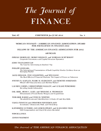
JOURNAL OF FINANCE
Exploring the depths of finance, economics, and accounting.JOURNAL OF FINANCE, published by Wiley, stands as a premier academic journal in the fields of finance, economics, and accounting. With a history dating back to 1946, the journal has consistently delivered impactful research that shapes financial theory and practice, boasting an impressive impact factor reflective of its high citation rate. Its Quartile 1 ranking in Accounting, Economics and Econometrics, and Finance illustrates its leading position within these disciplines. Although not an open access publication, the journal continues to be indispensable for researchers, professionals, and students seeking to advance their understanding and knowledge through rigorous empirical analysis and comprehensive reviews. With an esteemed global readership, the JOURNAL OF FINANCE remains committed to fostering the dissemination of innovative financial research well into 2024 and beyond.
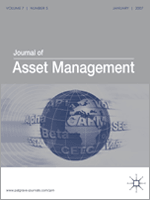
Journal of Asset Management
Navigating the Landscape of Strategic Asset ManagementThe Journal of Asset Management, published by Palgrave Macmillan Ltd, is a premier academic journal dedicated to advancing the fields of asset management, business strategy, and international management. With an ISSN of 1470-8272 and an E-ISSN of 1479-179X, this journal has established its reputation as a vital resource for researchers, professionals, and students alike. Operating from the United Kingdom, it spans a convergence of scholarly contributions from 2009 to 2024, positioning itself prominently in the academic landscape. In 2023, it achieved a remarkable Q2 ranking in three key categories: Business and International Management, Information Systems and Management, and Strategy and Management. The journal's Scopus ranks further reflect its impact, featuring positions within the top percentile for relevant academic disciplines, emphasizing its importance and influence. While it currently offers traditional subscription-based access, the journal remains committed to disseminating vital research that shapes best practices in asset management. Researchers are encouraged to engage with the cutting-edge findings published herein, making it an essential tool for anyone looking to deepen their understanding of asset management dynamics and strategic decision-making.

JOURNAL OF PORTFOLIO MANAGEMENT
Advancing the Art of Investment StrategiesJOURNAL OF PORTFOLIO MANAGEMENT is a premier academic journal dedicated to advancing the field of finance through rigorous research focused on investments, asset management, and portfolio strategies. Published by PAGEANT MEDIA LTD in the United States, this journal has established itself as a vital resource for finance professionals and scholars alike, as evidenced by its consistent ranking in the Q2 category across disciplines such as Accounting, Business Management, Economics, and Finance according to the latest categorization. With an emphasis on empirical studies and theoretical advancements since its inception in 1995, the journal remains a key player in the academic landscape, offering insights valuable for both researchers and practitioners. Although not an open-access journal, it provides access to high-quality, peer-reviewed articles that contribute significantly to the discourse on portfolio management. The ISSN for traditional publications is 0095-4918, while the E-ISSN is 2168-8656, ensuring wide-reaching dissemination of complex financial concepts. Immerse yourself in the latest findings to enhance your understanding and application of portfolio management strategies.
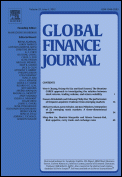
Global Finance Journal
Uncovering insights that shape financial landscapes.Global Finance Journal is an esteemed periodical published by Elsevier, dedicated to the dynamic fields of finance and economics. With an impressive history spanning from 1989 to 2024, this journal holds a significant position in the academic community, boasting a Q1 quartile ranking in both Economics and Econometrics, as well as Finance, as of 2023. It is highly regarded in Scopus rankings, placing 40th out of 317 in Finance and 99th out of 716 in Economics and Econometrics, demonstrating its influence and reach among researchers and practitioners alike. Although not an open-access journal, the Global Finance Journal provides rigorous peer-reviewed articles that explore critical issues, advance theoretical frameworks, and address practical applications in global finance. As such, it serves as a vital resource for researchers, financial professionals, and students aiming to deepen their understanding of economic phenomena and contribute to the ongoing discourse in these vibrant disciplines.
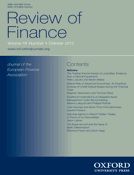
Review of Finance
Exploring the intersections of finance, accounting, and economics.The Review of Finance, published by Oxford University Press, stands as a premier academic journal in the fields of Finance, Accounting, and Economics. With an ISSN of 1572-3097 and an impressive track record stretching from 2001 to 2024, this journal is consistently recognized for its high-quality research, reflected in its Q1 rankings across key categories, including Accounting, Finance, and Economics and Econometrics. The Review of Finance is dedicated to advancing the understanding of financial phenomena through robust empirical and theoretical insights, making it an essential resource for researchers and professionals alike. Additionally, its strong Scopus rankings, placing it in the top percentiles, highlight its influence and relevance in ongoing academic discourse. Although the journal is not open access, it remains widely accessible through academic institutions, ensuring that its valuable contributions reach an extensive audience. The editorial board invites submissions that promise to further engage the academic community in the dynamic intersections of finance, accounting, and economic research.

Financial Innovation
Advancing the Future of Finance and TechnologyFinancial Innovation, published by Springer, is a premier open access journal that has been contributing to the fields of finance and management of technology and innovation since its inception in 2015. With an impressive Q1 category ranking in both Finance and Management of Technology and Innovation, the journal places itself at the forefront of academic research, reflected in its Scopus rankings—#17 out of 317 in Finance (94th percentile) and #29 out of 289 in Management of Technology and Innovation (90th percentile). Centered in Germany, this journal aims to disseminate high-quality research that fosters theoretical and practical advancements within its scope, encouraging exchanges between academia and industry. The open access model enhances visibility and accessibility of published research, thus playing a critical role in shaping the future of financial practices and technology management. For researchers, professionals, and students alike, Financial Innovation remains essential for staying abreast of cutting-edge developments and trends in these dynamic fields.

Journal of Investment Strategies
Navigating the Complexities of Economic DynamicsThe Journal of Investment Strategies, published by INCISIVE MEDIA, is a distinguished periodical focusing on pivotal issues within the realms of economics, finance, and management. With the ISSN 2047-1238 and E-ISSN 2047-1246, this journal has been making strides since its inception, presenting innovative research from 2018 to 2024. Designated in the Q2 category for both Economics, Econometrics and Finance and Strategy and Management as of 2023, it exemplifies its role as a crucial platform for scholars and practitioners who aim to disseminate knowledge and innovative strategies in investment. Although currently not open access, it provides robust insights into finance advocacy, economic dynamics, and strategic management practices. Researchers, professionals, and students alike can benefit from the journal's high-quality contributions that stimulate discussions and advance the understanding of complex investment landscapes, making it an essential resource in the pursuit of excellence in these competitive fields.

Journal of Alternative Investments
Pioneering discussions in the realm of alternative assets.The Journal of Alternative Investments, published by PAGEANT MEDIA LTD, is a prominent academic journal dedicated to the interdisciplinary field of finance and economics, with a specific focus on innovative investment strategies and asset classes. With an ISSN of 1520-3255 and an E-ISSN of 2168-8435, this journal is recognized for its rigorous peer-reviewed articles that delve into empirical and theoretical aspects of alternative investments. Although it currently does not offer open access, the journal serves as an essential resource for researchers and practitioners, showcasing high-quality contributions that can shape investment practices. Operating within the Q3 category as per the 2023 ranking in both Economics and Finance, it holds significant relevance in a rapidly evolving economic landscape. From its base in the United States and extending its influence globally, the Journal of Alternative Investments aims to provide insights that foster dialogue and a deeper understanding of alternative investment domains from 2007 to 2024 and beyond. Whether for academic research or professional application, this platform invites scholars, students, and investment professionals to explore the dynamic and crucial conversations shaping finance today.

Pacific-Basin Finance Journal
Exploring Financial Frontiers in the Pacific BasinPacific-Basin Finance Journal is a prestigious academic journal that focuses on critical developments and innovative research within the fields of finance and economics, specifically tailored to the Pacific region's unique economic landscape. Published by Elsevier, the journal boasts an impressive impact factor and is categorized in the Q1 quartile for both Economics and Econometrics and Finance as of 2023. This indicates its high relevance and position among the top journals in its field, with Scopus rankings reflecting a strong standing in the competitive landscape of finance research, holding the 45th position out of 317 in Finance and the 108th in Econometrics. Established in 1993, the journal is committed to disseminating rigorous theoretical and empirical research findings that enhance the understanding of financial systems in the Pacific Basin. Although the journal is not open access, it provides invaluable insights and comprehensive studies aimed at professionals, researchers, and students alike, fostering a deeper comprehension of the region's economic dynamics and global interconnectedness.
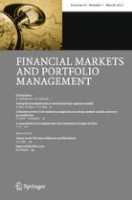
Financial Markets and Portfolio Management
Transforming Ideas into Investment Strategies.Financial Markets and Portfolio Management is a renowned peer-reviewed journal published by Springer, focusing on the dynamic and evolving intersections of finance, economics, and accounting. With an ISSN of 1934-4554 and an e-ISSN of 2373-8529, the journal provides a platform for innovative research on financial markets, investment strategies, and portfolio management techniques. It boasts an impactful presence in the academic community, with a Scopus ranking placing it in the 58th percentile in Finance and the 51st percentile in Accounting, underscoring its significance in both fields. Spanning coverage from 2006 to 2024, the journal offers essential insights for researchers, practitioners, and students interested in the latest developments and empirical analyses in financial practices. Although it does not offer open access options, its rigorous editorial standards ensure high-quality content accessible to library and institutional resources. The journal plays a pivotal role in advancing knowledge and fostering dialogue in an increasingly complex financial landscape.